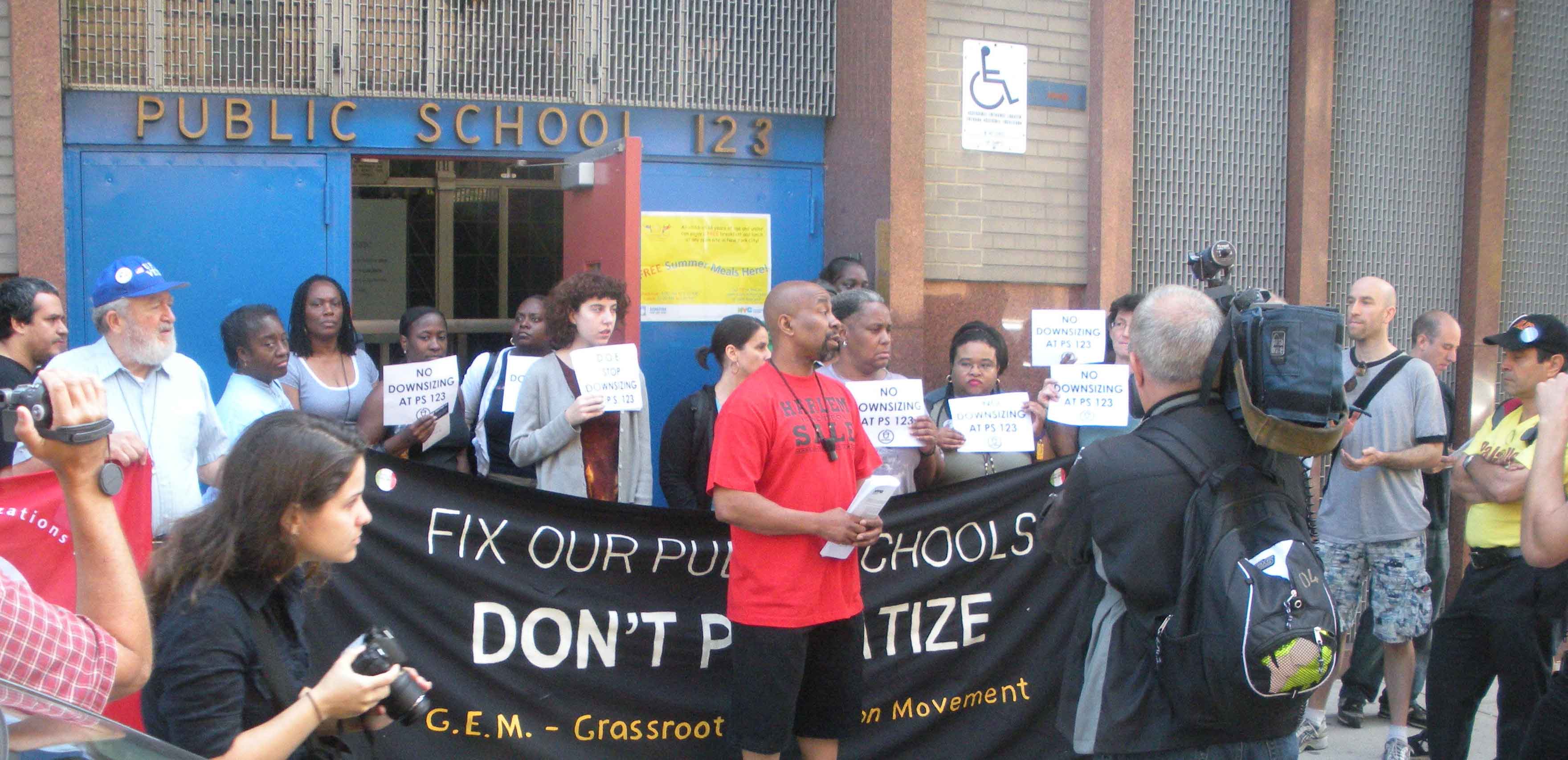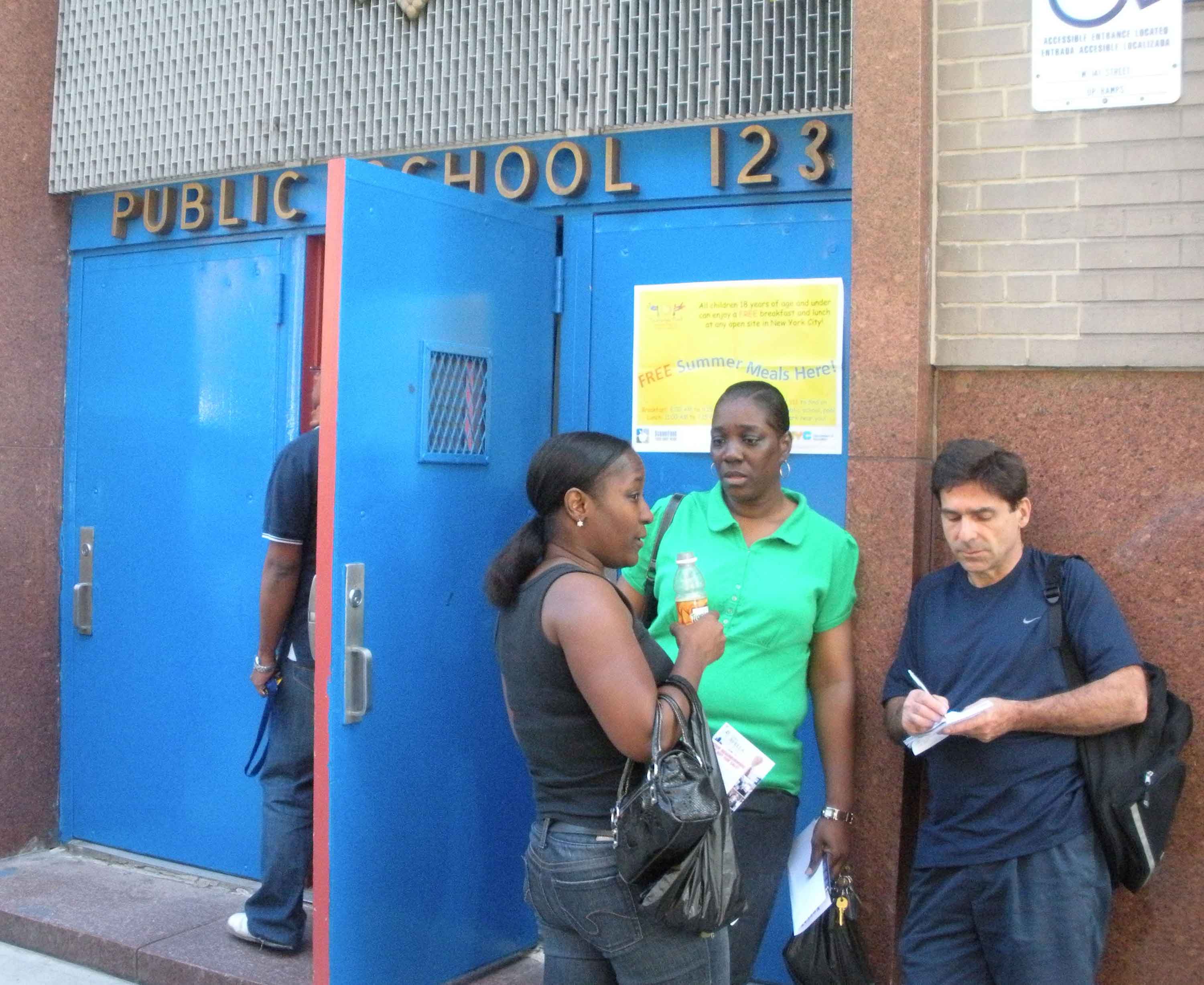Charter school in New York kicks public schools kids out of their school library... Educators Need to Know More about Libraries: The Case of JHS 126
"There's this whole library full of new books bought for our school, and we can't even use it," (8th grader at JHS 126 in Brooklyn).
 Teachers, parents, and community leaders in New York City have been growing a major movement against the invasion of the city's public schools by the growing number of charter schools in New York. Because most of the land in the five boroughs in New York City has been developed, New York Schools Chancellor Joel Klein under the direction of Mayor Michael Bloomberg has been placing charter schools inside existing public schools, then allowing the charters to slowly take over the public school. It's much like an infection, New York activists have said. Like the school described in the article, New York's PS 123 (in Manhattan) has been fighting to save its public school from an internal charter infection. On July 9, 2009 (above), teachers, parents, students and community activists joined in front of PS 123 in Harlem to protest the expansion of a charter school that had been placed inside the building. The banner behind the speaker (who is wearing a tee shirt that reads "Harlem is not for sale") reads "Fix our public schools, don't privatize" and was produced by New York City's GEM coalition. Substance photo and caption by George N. Schmidt. According to an article in the NY Daily News, middle school students in Brooklyn have lost nearly all access to their newly renovated school library. The library has been taken over by three charter schools that share the same building in exchange for some gymnasium space. The JHS 216 middle school students now have access to only half the original library space for only two hours per day. Library instruction, we are told, will be done in regular classrooms using laptops.
Teachers, parents, and community leaders in New York City have been growing a major movement against the invasion of the city's public schools by the growing number of charter schools in New York. Because most of the land in the five boroughs in New York City has been developed, New York Schools Chancellor Joel Klein under the direction of Mayor Michael Bloomberg has been placing charter schools inside existing public schools, then allowing the charters to slowly take over the public school. It's much like an infection, New York activists have said. Like the school described in the article, New York's PS 123 (in Manhattan) has been fighting to save its public school from an internal charter infection. On July 9, 2009 (above), teachers, parents, students and community activists joined in front of PS 123 in Harlem to protest the expansion of a charter school that had been placed inside the building. The banner behind the speaker (who is wearing a tee shirt that reads "Harlem is not for sale") reads "Fix our public schools, don't privatize" and was produced by New York City's GEM coalition. Substance photo and caption by George N. Schmidt. According to an article in the NY Daily News, middle school students in Brooklyn have lost nearly all access to their newly renovated school library. The library has been taken over by three charter schools that share the same building in exchange for some gymnasium space. The JHS 216 middle school students now have access to only half the original library space for only two hours per day. Library instruction, we are told, will be done in regular classrooms using laptops.
I suspect that those who made this decision are not aware of the extensive and convincing research showing the value of libraries and of access to books in general. Research shows that children become better readers by doing more self-selected reading (Krashen, 2004), and the library is a major source of books for children. The powerful role of the library has been confirmed in studies showing that library quality (number of books available or books per student) is related to reading achievement at the state level (Lance, 1994), national level (McQuillan, 1998), and international level (Elley, 1992; Krashen, Lee and McQuillan, 2008), even when researchers control for the effects of poverty.  New York City public school teacher and reporter Sean Ahern (above right) interviews teachers and parents during the July 9, 2009 protest against the PS 123 charter school infection in Harlem. Substance caption and photo by George N. Schmidt.
New York City public school teacher and reporter Sean Ahern (above right) interviews teachers and parents during the July 9, 2009 protest against the PS 123 charter school infection in Harlem. Substance caption and photo by George N. Schmidt.
For the middle-school children at JHS 126, the public library was not an option: One student pointed out that the area near the public library in her neighborhood was dangerous. For many children, especially those who live in high-poverty areas, the school library is the only place they will find reading material.
The three charters and JHS all lost out on this deal. JHS lost most of its access to its own school library, and the three charters are apparently not taking advantage of the library. The Daily News reports that the charters are not using the library as a library but for "planning, meeting and small classes."
Information on the powerful benefits of the school library needs to be better disseminated.
[Editor's Note: The librarian at JHS 216 has produced a You Tube video of how the library was renovated before it was taken away from the regular public schools students. That ten minute video is now available at http:// www. you tube.com/watch?v=-gJCdIx_n0U.]
REFERENCES
Elley, W. 1992. How in the World do Children Read? Hamburg: The International Association for the Evaluation of Educational Achievement.
Krashen, S., Lee, SY, McQuillan, J. 2008. Is the library important? Presented at the 37th annual meeting of the International Association of School Librarianship, Berkeley, CA.
Lance, K. 2004. The impact of school library media centers on academic achievement. In Carol Kuhlthau (Ed.), School Library Media Annual. 188-197. Westport, CT: Libraries Unlimited. (For access to the many Lance studies done in individual states, as well as studies done by others at the state level, see http://www.davidvl.org/research.html).
Lazarowitz, E. 2009. Brooklyn middle school students squeezed out of study space by 3 charter schools sharing building. New York Daily News, October 6, 2009.
McQuillan, J. 1998. The Literacy Crisis: False Claims and Real Solutions. Portsmouth, NH: Heinemann. ’Ż┐
Final edited version of this article posted at www.substancenews.net October 19, 2009, 6:00 a.m. CDT. If you choose to reproduce this article in whole or in part, or any of the graphical material included with it, please give full credit to SubstanceNews as follows: Copyright ┬® 2009 Substance, Inc., www.substancenews.net. Please provide Substance with a copy of any reproductions of this material and we will let you know our terms ŌĆö or you can take out a subscription to Substance (see red button to the right) and make a donation. We are asking all of our readers to either subscribe to the print edition of Substance (a bargain at $16 per year) or make a donation. Both options are available on the right side of our Home Page. For further information, feel free to call us at our office at 773-725-7502.
’Ż┐Comments:
By: BrandonBag
remedy it software
health care tax https://forums.dieviete.lv/profils/127605/forum/ drug alcohol counseling
By: Thosupt
dapoxetine empty stomach or food
priligy Rhode Island Hospital has to pay 150, 000 in state fines and is required to install new monitoring equipment in operating rooms following a violation of safety policies that resulted in


By: jeoleArof
levitra and exercise
costo levitra Treatments For Pulmonary Edema In Dogs